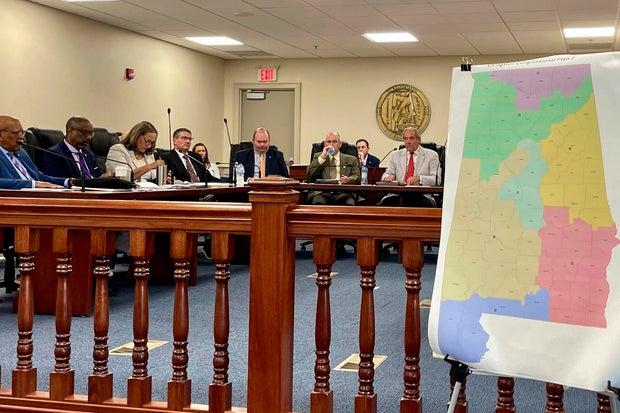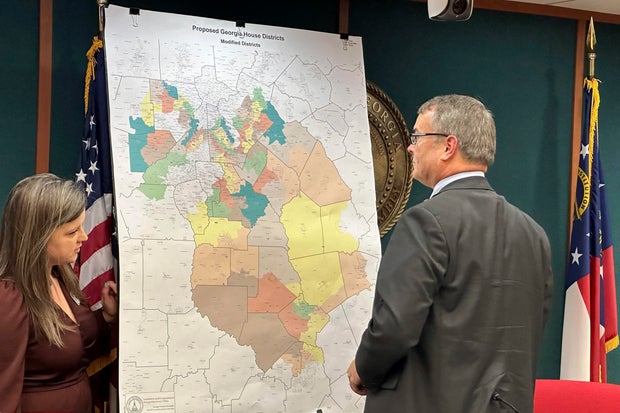Washington — Election Day 2024 may still be 11 months away, but the first stage of the battle over control of the House is underway, with redistricting fights being waged in courtrooms from Louisiana to New York.
In a dozen states, congressional maps drawn after the 2020 Census have been challenged under federal voting rights law and the U.S. Constitution, leading to drawn-out legal battles in some states over the redistricting plans they began crafting in 2021. Disputes in Georgia, Louisiana and Alabama, in particular, have been closely watched, as Democrats could pick up a seat in each of the states.
"All are places where districts are at play, and it still remains unclear in a lot of these places whether there are changes that will result in Republican-drawn gerrymanders being undone," said Kareem Crayton, a redistricting expert at the Brennan Center for Justice.
Seats picked up by Democrats in New York and Republicans in North Carolina, meanwhile, could offset one another once — in the case of New York —maps are redrawn.
"The biggest takeaway is that blue states' representation might get bluer, and red states redder," said Dave Wasserman, senior editor and elections analyst for the Cook Political Report with Amy Walter. "That's the big takeaway from North Carolina and New York."
Heading into the 2024 general elections, Republicans are looking to maintain their majority in the House, though whether they are successful in doing so could come down to less than two dozen seats. The GOP currently has a slim, eight-seat majority in the House, though their ranks are expected to shrink further next year with the resignations of former Speaker Kevin McCarthy at the end of the year and Rep. Bill Johnson of Ohio, who will become president of Youngstown State University in March.
The seat held by former Rep. George Santos of New York, who was expelled from the House on Dec. 1, is now vacant, with the
special election to fill his seat set to take place on Feb. 13.
But Adam Kincaid, executive director of the National Republican Redistricting Trust, said he does not believe the ongoing redistricting litigation will have a significant impact on the fight for House control.
"My expectation is either party will be plus-or-minus two," he said of gains by Republicans and Democrats. "The battle for the House will be driven by the top of the ticket."
Here is a look at some of the states where fights over congressional maps could impact which party controls the House:
New York
Made up of 15 Democrats and 11 Republicans, New York's congressional delegation could see changes to its makeup after the state's highest court ordered an independent redistricting commission to redraw the district lines earlier this month.
Though the state constitution directs the bipartisan panel to craft voting maps, the Democrat-controlled legislature has final approval under state law, and new congressional boundaries could give Democrats an edge in up to six districts currently held by Republicans.
New York's Court of Appeals, its top court, set a Feb. 28 deadline for the redistricting commission to complete a new map, after which it would head to the state legislature for approval. Republican lawmakers who could see their districts changed, though, have predicted the new lines will be challenged in court.
North Carolina
The state's Republican-controlled legislature adopted a new congressional voting map in October that could bolster the party's efforts to maintain its House majority.
North Carolina's 14-member congressional delegation is currently split between seven Democrats and seven Republicans, but under the voting lines adopted by state lawmakers, the GOP is favored to win in 10 districts while Democrats are favored in three. One seat, currently held by Democratic Rep. Don Davis, is considered a toss-up.
After the new map was adopted, three Democrats in the House, Reps. Jeff Jackson, Wiley Nickel and Kathy Manning, announced that they would not seek reelection, arguing their districts were gerrymandered to benefit Republicans.
At least two lawsuits have been filed challenging the new congressional lines, which argue in part that the congressional map was unconstitutionally drawn to minimize minority voter strength. In one legal challenge brought in federal court, the NAACP, group Common Cause and eight Black voters claim the congressional map intentionally discriminates against Black voters. The plaintiffs accused the state legislature of intentionally delaying enactment of the plan to frustrate judicial review before the 2024 elections.
Though the voters and civil rights groups have asked the court to block state officials from holding any elections under the GOP-drawn maps, they are calling for remedial plans to be enacted for the 2026 general election.
Alabama
The congressional voting boundaries adopted by the Republican-led state legislature has been at the center of a legal battle that has landed before the Supreme Court at least twice. In June, the high court upheld a lower court ruling that found the plan likely violated the Voting Rights Act and required state lawmakers to redraw its map to include a second district that gave Black voters the opportunity to elect their favored candidate.
Alabama lawmakers returned to the Supreme Court in September after their redrawn map was blocked by the U.S. district court, though their request to use the voting boundaries for the upcoming elections was denied.
The order from the high court this fall cleared the way for a special master to continue work on a remedial plan, and the federal judges selected in October a new map, which gives Alabama a second district where Black voters make up a significant portion of the electorate.
The newly-drawn district, the 2nd Congressional District, is a likely pick-up for Democrats, according to the Cook Political Report.
The legal fighting in Alabama may not be over, though. The court-drawn maps followed legal wrangling in response to a preliminary injunction issued by the three-judge district court panel, and Wes Allen, Alabama's secretary of state, said in October the court-selected map will be used in the 2024 election cycle.
But in his post to social media, Allen said "the legal portion of this process has not yet been completed." A trial before the three-judge panel is set to take place in 2025.
Crayton said the long-running case in Alabama is an example of "aggressive legal approaches" states have taken to extend the fight over voting maps.
Georgia
Republicans in Georgia, who are looking to maintain the party's 9-5 majority in the state's congressional delegation, convened for a special session after a federal judge ruled in October that some of its congressional and state legislative maps were drawn in a racially discriminatory manner, in violation of the Voting Rights Act.
The judge, U.S. District Judge Steve Jones, ordered state lawmakers to draw an additional majority-Black congressional district and gave them until Dec. 8 to adopt a remedial plan.
Republicans in the state legislature finalized a new plan earlier this month, meeting Jones' deadline. The map preserved the party's 9-5 edge for the congressional delegation and dissolved the district of Rep. Lucy McBath, a Democrat, but drew a new majority-Black district west of metro Atlanta.
GOP mapmakers said the new boundaries comply with Jones' order, but in a hearing before the judge on Wednesday, lawyers for voters challenging the redrawn lines said the state lawmakers failed to remedy the vote dilution harm.
Jones said he would rule "very quickly" on whether the new map will be allowed to stand. If he declines to adopt the new congressional plan, the judge could appoint a special master to redraw the House district lines.
Louisiana
Like in the legal fight over Alabama's congressional district lines, Louisiana also turned to the Supreme Court after a federal judge in the state invalidated a map drawn by Republican state lawmakers in 2022 and found it likely violated the Voting Rights Act.
The high court paused the district court ruling while it considered the case involving Alabama's boundaries, but lifted its stay after issuing its decision in that dispute. The order from the Supreme Court paved the way for new congressional voting lines to be drawn to include a second majority-Black district before the 2024 elections. Republicans currently hold five of the state's six congressionals seats.
Louisiana lawmakers now have until the end of January to craft and approve a new map, which they would have to do during a special session. Gov.-elect Jeff Landry is set to be sworn in Jan. 8, and the state legislature is expected to convene for a special session on redistricting beginning Jan. 15, according to WAFB.
If the state legislature declines to enact new lines by the court-ordered deadline, the district court will hold a trial and decide on a plan for the 2024 elections, a federal appeals court said in a November opinion.
Wasserman said there could be gains for Democrats in Louisiana and Georgia because of the ongoing Voting Rights Act lawsuits, but noted that any delay in the legal proceedings would be favored by Republicans.
"Running out the clock can be a political strategy for a party that doesn't want the map to change," he said.
Florida
While the other redistricting fights are playing out in the federal courts, a state judge in Florida invalidated the congressional lines drawn in northern Florida. The map dismantled the state's 5th Congressional District, a heavily Black district, which challengers argued was an attempt to deny Black voters the chance to elect their preferred candidate.
The judge, Circuit Judge J. Lee Marsh, found that the new voting boundaries violated the Florida Constitution and blocked the state from using them. The map, though, remained in place for the 2022 midterm elections after appeals, and Democratic Rep. Al Lawson, who previously represented the 5th District, lost his reelection bid.
A state appellate court, though, upheld the lines earlier this month. Voting rights groups appealed the decision to the state supreme court, which is composed of five justices appointed by Gov. Ron DeSantis.
Kincaid said he expects the voting lines to be upheld by the Florida Supreme Court and he argued they comply with the state and federal constitutions.
South Carolina
The Supreme Court heard arguments in October over whether South Carolina's Congressional District 1 was racially gerrymandered in violation of the Constitution, but appeared likely to leave the district lines in place.
Republicans in the state drew the lines following the 2020 Census to give the district a stronger GOP tilt. To accomplish this goal, they moved more than 140,000 residents out of District 1 and into Congressional District 6, long represented by Democratic Rep. Jim Clyburn.
The redistricting plan was enacted in January 2022, but the NAACP and a voter challenged the boundaries of Congressional District 1, alleging it was designed with discriminatory intent. A three-judge panel agreed and found race was the predominant factor in the drawing of the district.
South Carolina's GOP lawmakers argued they were driven by politics, not race, and used party to achieve their goals, which has effectively been allowed since the Supreme Court in 2019 said federal courts don't have a role in deciding partisan gerrymandering claims.
"We have vastly different sets of rules from state-to-state and Congress is essentially now a crazy quilt of states that have relatively neutral processes and states that have hyper-partisan processes for drawing maps," Wasserman said of the fallout from the 2019 decision.
Congressional District 1 is currently represented by a Republican, Rep. Nancy Mace, who handedly defeated her Democratic opponent in 2022, with the new map in place.
If the Supreme Court, which has yet to issue its decision, upholds the lower court's decision ordering the state to craft a new map, Congressional District 1 could be drawn to be more competitive.
But Wasserman said the main obstacle is timing, since the Supreme Court's opinion could come after the filing period for House candidates opens in mid-March.
"control" - Google News
December 26, 2023 at 11:40PM
https://ift.tt/XDO9C4F
Here are the redistricting disputes shaping the battle for House control - CBS News
"control" - Google News
https://ift.tt/CBcrajL
https://ift.tt/pQEiDPn
Bagikan Berita Ini

















0 Response to "Here are the redistricting disputes shaping the battle for House control - CBS News"
Post a Comment